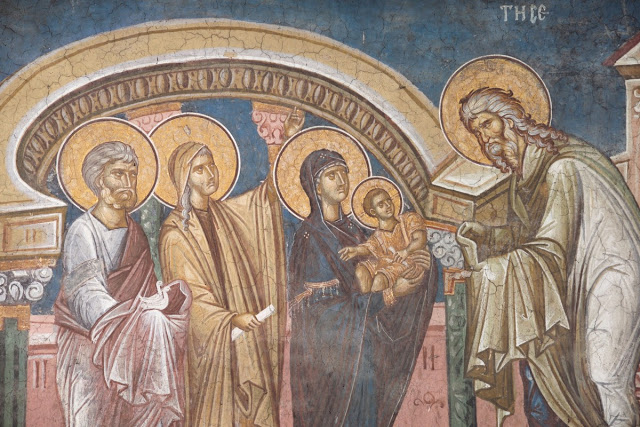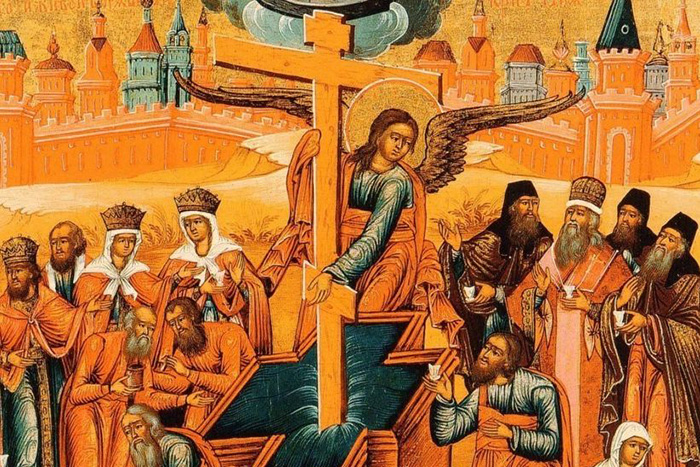
People often tell me how beautiful the Lenten and Pascha services are. I’ve never once heard anybody say, “O Father, I so much enjoyed those interminable Kneeling Prayers” – at “Kneeling Vespers” which immediately follows Pentecost Divine Liturgy.
This service, popularly nicknamed Kneeling Vespers, really ought to be celebrated on Pentecost night, but long ago the Church learned that hardly anybody is going to come back on a summer Sunday evening, so she wisely directs us to have it after Liturgy before everybody can escape. (At Saint Nicholas we begin Pentecost Divine Liturgy a bit early to facilitate things.)
The feast of Pentecost concludes the great Fifty Days between Pascha and Pentecost when we do not kneel in church. We are risen with Christ: We stand.
But now we resume kneeling with these 3 “kneeling prayers”. They’re beautiful, granted, but if the priest reads them in their entirety it feels like they’re never going to end – especially if the weather outside is beautiful and beckoning and people can hardly wait to escape. So why does the Church give us this unenjoyable service?
To make the point that the Great Feast is over. Now we’re going back to “ordinary”.
The Church year from Advent to Pentecost teaches us the life of Christ. The Church year also teaches us about our life. Sometimes life is a Feast like Pascha: the great, happy times. Sometimes life is a Fast like Lent. It gives us trouble. But like the half of the year from Pentecost till Advent, most of our life is just ordinary. In some ways “ordinary” is the most dangerous, harder to handle than either feasting or fasting. (This picture of people kneeling looks pretty ordinary, doesn’t it?) The good times come naturally to us. Have you noticed that when we have good health and peace and prosperity, when the world is filled with kindness and decency, we quickly take it for granted? and sometimes we feel guilty about that, because we’re so ungrateful. No. That’s because God has made us for these things. They are natural to us. During the hard times we usually get focused, and we turn to God, and we summon up our inner resources, just in order to survive. It’s in life’s ordinary times, when nothing special is happening, that we can get lax and drift off.

So Pentecost Vespers shows us how to handle the ordinary times:
- Kneel, with humility before God.
- Pray: much prayer, for the living, for the dead, for ourselves. Pray in the community, our lives enclosed by the continual prayers of the Church.
- Don’t expect too much. Life is never going to be a continual feast, and like the Kneeling Prayers, the ordinary times may seem to go on forever. We don’t get the unending joy till we get to heaven. Life is often a quiet undramatic plodding along. So don’t have unrealistically high expectations about life. Kneeling Vespers certainly teaches us that!
As we proceed through the many weeks after Pentecost, we will in fact find some beautiful feasts and also some fast periods and fasting days, the ups and downs of daily life. All these Sundays will be titled “Sundays after Pentecost”. God’s Holy Spirit is there in the midst of it all. If we look, we will find much quiet joy in the ordinary times – so long as we don’t expect it to be Pascha every day, and so long as we continue in the pattern the Church now sets forth for us: Kneel. Pray with the Church. And don’t expect too much – not yet.
So, brother and sisters, get your knees ready. Here we go into the ordinary times.
God bless and keep you all.
Source: https://blogs.ancientfaith.com/frbill/67-the-4th-of-6-thoughts-about-pentecost/




